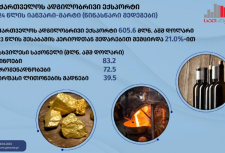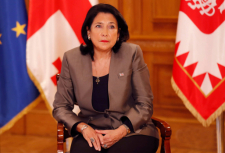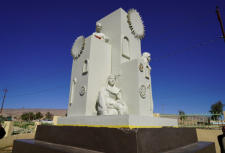Fourth Report of the Republic of Armenia on Implementation of the Council of Europe Framework Convention for the Protection of National Minorities

According to the Census Program (Questionnaire) of the Republic of Armenia for 2011, approved by the Decision of the Government of the Republic of Armenia No 674-N of 12 May 2011, the questions concerning nationality, proficiency in mother tongue and other languages of the members of a household were closed-ended questions, that is, the list of possible answers were provided in the questionnaire. The following answers were included among possible answers to the question concerning the nationality: Armenian, Yazidi, Russian, Assyrian, Greek, Ukrainian, Kurd, Polish, Belarusian, Georgian, Jew, German, Persian, other nationality and the possible answers to the question concerning proficiency in mother tongue and other languages included the following options: Armenian, Yazidi, Russian, Assyrian, Greek, Ukrainian, Kurdish, Polish, Belarusian, Georgian, Hebrew, English, French, German, Spanish, Persian, Turkish, other language.
As part of the fulfilment of the above-mentioned responsibilities, the Public Television and Radio Company regularly broadcasts program about national minorities of the Republic of Armenia dedicated not only to their language, culture and history but also to their problems. Moreover, during a day the Public Radio Company broadcasts program son its ultra-short-radio-wave in five national minority languages1: Kurdish, Yazidi, Assyrian, Russian and Greek, which in total exceed one hour per day. The program in each language last up to one hour per day. Films in national minority languages are also broadcast by the Public Television and Radio Company, which are accompanied by caption in Armenian.
Upon nomination by organisations represented in the Coordinating Council and with the intermediation of the Staff of the President of the Republic of Armenia, every academic year since 2007, representatives of Yazidi, Kurdish and Assyrian communities were without competition provided with seats for studying at the Faculty of Oriental Studies of Yerevan State University. Since 2010, representatives of other national minorities, nominated by the organisations representing relevant communities in the Coordinating Council and having a desire to study at departments of culture and language of higher education institutions with the aim of developing national culture and language, also have the possibility of enjoying these privileges.
Subsequently, with the intermediation of the Coordinating Council, the higher education institution provides full or partial discount of tuition fee to those students. Besides, the Armenian Youth Foundation provides financial support both for the education of Yazidi students and for the implementation of cultural programmes proposed by youth organisations representing the Yazidi Community. The Coordinating Council and the Armenian Youth Foundation ensure the participation of young representatives of 11 national minorities of the Republic of Armenia in Pan-Armenian youth gatherings.
A historical and documentary work (written by M. Muradyan), dedicated to Usubbek Temuryants, member of the Parliament of the first Republic of Armenia, the leader of the Yazidis of Transcaucasia , was published in 2012. Yazidi Community Participation of Yazidi people in the Karabachos War, written by Aziz Tamoyan and Hasan Tamoyan, in 2010.
According to the provisions of the National Security Strategy of the Republic of Armenia for 2011-2012, for the purpose of maintaining and developing cultural life of national minorities, a number of events presenting their ethnography and modern arts were organised, including:
“Sinjar-Yazidi” National Union NGO organised a drawing contest-exhibition called “In pencil” in March 2012.
Key programmes implemented at the expense of annual grant programmes provided for by the state budget of the Republic of Armenia, approved at the Coordinating Council for National and Cultural Organisations of National Minorities of the Republic of Armenia in 2012-2013:
Assyrian, Yazidi, Kurdish, Greek, Russian, Belarusian, Ukrainian, Georgian communities obtained folk costumes for members of song and dance bands;
For the purpose of maintaining and developing cultural life of national minorities, non-governmental organisations of national minorities were provided with support, specifically, in:
(1) Organising educational , cultural events of Yazidis (Yazidi National Union NGO);
In 2012-2013, under Publication of non-state press programme, support was provided for 11 newspapers and 2 magazines in national minority languages. During the year,2 books are to be published from the literature of national minorities : Smoye Shamo: Life and activities (memoirs) by Vasire Asho and Articles by Alikhane Mame.
The table below presents the press in national minority languages.
Press in national minority languages:
1. Yazidikhana (Armenian, Yazidi) - Yazidi National Union NGO -900000
2. Lalish (Armenian, Yazidi)- Yazidi National Committee NGO -900000
By the Executive Order of the President of the Republic of Armenia of 29 December 2010, 13 members of the Coordinating Council were awarded letters of appreciation for long-term effective performance and for their contribution to inter-community co-operation:
Siaband Bakoyan -Yazidi community
Rzzo Shamoyan (Yazidi) – “Medal of Mkhitar Heratsi”- 2014
The Parties shall ensure respect for the right of every person belonging to a national minority to freedom of peaceful assembly, freedom of association, freedom of expression, and freedom of thought, conscience and religion.
It is prescribed by Article 28 of the Constitution of the Republic of Armenia that everyone shall have the right to form associations, including the right to join thereto. At the same time, it is worth mentioning that Article 47(2) provides for a limitation, particularly stating:
The exercise of rights and freedoms with the purpose of violent overthrow of the constitutional order, provocation of national, racial, religious hatred, propaganda of violence or warfare shall be prohibited:
in October 2012, the delegation led by the spiritual leader of world Yazidis Mire-Mira Takhsin Beg visited the Republic of Armenia, which was officially received by the Chairperson of the National Assembly of the Republic of Armenia, the Prime Minister of the Republic of Armenia and the Catholicons of All Armenians. The latter participated in the ceremony of the consecration of the second biggest temple of Yazidi religion after Lalish, Ziyarat, which was built in 2011 in Aknalich settlement of Armavirmarz. Thereafter, the site development of a large-scale spiritual and cultural complex of Yazidis continued: a huge events hall was built; five stone monuments were built (monuments of Yesidi UsubBek and Jhangir Agha, military commander Andranik dedicated to the Armenian-Yazidi friendship and the 100th commemoration of the Armenian Genocide); the whole area has been planted and improved.
Over the past years following independence adequate legislative framework has been established in Armenia which provides for appropriate conditions to ensure religious diversity in the country. According to data as of 2014, 66 religious organisations are registered in the State Register of Legal Entities of the Republic of Armenia whereof 9 are the religious organisations of national minorities (including Russian, Assyrian, Jewish, Yazidi religious communities). Pursuant to Article 5 of the Law of the Republic of Armenia On freedom of conscience and religious organisations in force the terms established for registration of religious organisations are not compulsory for religious organisations of national minorities and the latter benefit from preferential and simplified terms prescribed by law when obtaining state registration.
The issues concerning national minorities are always in the spotlight of the Public Television. Issues, as well as historical and cultural events of the national minorities are regularly covered by the news service of the Public Television Company. The Public Radio Company broadcasts programmes in the national minority languages, particularly, in Kurdish, Yazidi, Assyrian, Russian, Greek, etc. The Radio broadcasts specific programmes (e.g. Armenia is our home), which also in national minority languages present events held by national minorities, the organisations thereof, as well as the current challenges.
Besides general news broadcasts in Kurdish, Yazidi, Assyrian, Georgian and Russian languages, there are also programmes covering the topics of culture and history, as well as folklore in national minority languages. Besides being broadcasted through public radio transmitters, the mentioned programmes are also available at www.armradio.am.
Textbooks Yazidi language and literature for 1-11 grades have been published and republished since 2005 with funding provided by the Ministry of Education and Science of the Republic of Armenia.
The Yazidis and Assyrians living in Armenia have established an educational and methodological base in the system of general education with the support of state institutions. Subject committees for Iranian studies and “Semiology” function in the National Institute of Education of the Ministry of Education and Science of the Republic of Armenia (NIE MES RA), which carry out expert examination of the curricula, textbooks, manuals in Yazidi, Kurdish and Assyrian languages.
Textbooks of Yazidi language for the 1st-8th grades have been developed and published. The Yazidi community also actively participated in the development of these textbooks with involvement of Yazidi specialists of the National Institute of Education of the Ministry of Education and Science (NIE MES) of the Republic of Armenia.
the National Institute of Education of the Ministry of Education and Science of the Republic of Armenia regularly conducts trainings for Yazidi teachers, as well as organises courses of Armenian language for the representatives of national minorities.
The representatives of national minorities are fully integrated to the social and economic life of the Republic. Assyrian, Greek, Kurd and Yazidi physicians work in the health sector. In 2013, a representative of Yazidi community became a member of Council of Elders of Yerevan. The Vice President of the National Assembly is Greek by nationality, etc.
David Babaev
Yazidis.info
Tags:
Fourth Report of the Republic of Armenia on Implementation of the Council of Europe Framework Convention for the Protection of National Minorities

According to the Census Program (Questionnaire) of the Republic of Armenia for 2011, approved by the Decision of the Government of the Republic of Armenia No 674-N of 12 May 2011, the questions concerning nationality, proficiency in mother tongue and other languages of the members of a household were closed-ended questions, that is, the list of possible answers were provided in the questionnaire. The following answers were included among possible answers to the question concerning the nationality: Armenian, Yazidi, Russian, Assyrian, Greek, Ukrainian, Kurd, Polish, Belarusian, Georgian, Jew, German, Persian, other nationality and the possible answers to the question concerning proficiency in mother tongue and other languages included the following options: Armenian, Yazidi, Russian, Assyrian, Greek, Ukrainian, Kurdish, Polish, Belarusian, Georgian, Hebrew, English, French, German, Spanish, Persian, Turkish, other language.
As part of the fulfilment of the above-mentioned responsibilities, the Public Television and Radio Company regularly broadcasts program about national minorities of the Republic of Armenia dedicated not only to their language, culture and history but also to their problems. Moreover, during a day the Public Radio Company broadcasts program son its ultra-short-radio-wave in five national minority languages1: Kurdish, Yazidi, Assyrian, Russian and Greek, which in total exceed one hour per day. The program in each language last up to one hour per day. Films in national minority languages are also broadcast by the Public Television and Radio Company, which are accompanied by caption in Armenian.
Upon nomination by organisations represented in the Coordinating Council and with the intermediation of the Staff of the President of the Republic of Armenia, every academic year since 2007, representatives of Yazidi, Kurdish and Assyrian communities were without competition provided with seats for studying at the Faculty of Oriental Studies of Yerevan State University. Since 2010, representatives of other national minorities, nominated by the organisations representing relevant communities in the Coordinating Council and having a desire to study at departments of culture and language of higher education institutions with the aim of developing national culture and language, also have the possibility of enjoying these privileges.
Subsequently, with the intermediation of the Coordinating Council, the higher education institution provides full or partial discount of tuition fee to those students. Besides, the Armenian Youth Foundation provides financial support both for the education of Yazidi students and for the implementation of cultural programmes proposed by youth organisations representing the Yazidi Community. The Coordinating Council and the Armenian Youth Foundation ensure the participation of young representatives of 11 national minorities of the Republic of Armenia in Pan-Armenian youth gatherings.
A historical and documentary work (written by M. Muradyan), dedicated to Usubbek Temuryants, member of the Parliament of the first Republic of Armenia, the leader of the Yazidis of Transcaucasia , was published in 2012. Yazidi Community Participation of Yazidi people in the Karabachos War, written by Aziz Tamoyan and Hasan Tamoyan, in 2010.
According to the provisions of the National Security Strategy of the Republic of Armenia for 2011-2012, for the purpose of maintaining and developing cultural life of national minorities, a number of events presenting their ethnography and modern arts were organised, including:
“Sinjar-Yazidi” National Union NGO organised a drawing contest-exhibition called “In pencil” in March 2012.
Key programmes implemented at the expense of annual grant programmes provided for by the state budget of the Republic of Armenia, approved at the Coordinating Council for National and Cultural Organisations of National Minorities of the Republic of Armenia in 2012-2013:
Assyrian, Yazidi, Kurdish, Greek, Russian, Belarusian, Ukrainian, Georgian communities obtained folk costumes for members of song and dance bands;
For the purpose of maintaining and developing cultural life of national minorities, non-governmental organisations of national minorities were provided with support, specifically, in:
(1) Organising educational , cultural events of Yazidis (Yazidi National Union NGO);
In 2012-2013, under Publication of non-state press programme, support was provided for 11 newspapers and 2 magazines in national minority languages. During the year,2 books are to be published from the literature of national minorities : Smoye Shamo: Life and activities (memoirs) by Vasire Asho and Articles by Alikhane Mame.
The table below presents the press in national minority languages.
Press in national minority languages:
1. Yazidikhana (Armenian, Yazidi) - Yazidi National Union NGO -900000
2. Lalish (Armenian, Yazidi)- Yazidi National Committee NGO -900000
By the Executive Order of the President of the Republic of Armenia of 29 December 2010, 13 members of the Coordinating Council were awarded letters of appreciation for long-term effective performance and for their contribution to inter-community co-operation:
Siaband Bakoyan -Yazidi community
Rzzo Shamoyan (Yazidi) – “Medal of Mkhitar Heratsi”- 2014
The Parties shall ensure respect for the right of every person belonging to a national minority to freedom of peaceful assembly, freedom of association, freedom of expression, and freedom of thought, conscience and religion.
It is prescribed by Article 28 of the Constitution of the Republic of Armenia that everyone shall have the right to form associations, including the right to join thereto. At the same time, it is worth mentioning that Article 47(2) provides for a limitation, particularly stating:
The exercise of rights and freedoms with the purpose of violent overthrow of the constitutional order, provocation of national, racial, religious hatred, propaganda of violence or warfare shall be prohibited:
in October 2012, the delegation led by the spiritual leader of world Yazidis Mire-Mira Takhsin Beg visited the Republic of Armenia, which was officially received by the Chairperson of the National Assembly of the Republic of Armenia, the Prime Minister of the Republic of Armenia and the Catholicons of All Armenians. The latter participated in the ceremony of the consecration of the second biggest temple of Yazidi religion after Lalish, Ziyarat, which was built in 2011 in Aknalich settlement of Armavirmarz. Thereafter, the site development of a large-scale spiritual and cultural complex of Yazidis continued: a huge events hall was built; five stone monuments were built (monuments of Yesidi UsubBek and Jhangir Agha, military commander Andranik dedicated to the Armenian-Yazidi friendship and the 100th commemoration of the Armenian Genocide); the whole area has been planted and improved.
Over the past years following independence adequate legislative framework has been established in Armenia which provides for appropriate conditions to ensure religious diversity in the country. According to data as of 2014, 66 religious organisations are registered in the State Register of Legal Entities of the Republic of Armenia whereof 9 are the religious organisations of national minorities (including Russian, Assyrian, Jewish, Yazidi religious communities). Pursuant to Article 5 of the Law of the Republic of Armenia On freedom of conscience and religious organisations in force the terms established for registration of religious organisations are not compulsory for religious organisations of national minorities and the latter benefit from preferential and simplified terms prescribed by law when obtaining state registration.
The issues concerning national minorities are always in the spotlight of the Public Television. Issues, as well as historical and cultural events of the national minorities are regularly covered by the news service of the Public Television Company. The Public Radio Company broadcasts programmes in the national minority languages, particularly, in Kurdish, Yazidi, Assyrian, Russian, Greek, etc. The Radio broadcasts specific programmes (e.g. Armenia is our home), which also in national minority languages present events held by national minorities, the organisations thereof, as well as the current challenges.
Besides general news broadcasts in Kurdish, Yazidi, Assyrian, Georgian and Russian languages, there are also programmes covering the topics of culture and history, as well as folklore in national minority languages. Besides being broadcasted through public radio transmitters, the mentioned programmes are also available at www.armradio.am.
Textbooks Yazidi language and literature for 1-11 grades have been published and republished since 2005 with funding provided by the Ministry of Education and Science of the Republic of Armenia.
The Yazidis and Assyrians living in Armenia have established an educational and methodological base in the system of general education with the support of state institutions. Subject committees for Iranian studies and “Semiology” function in the National Institute of Education of the Ministry of Education and Science of the Republic of Armenia (NIE MES RA), which carry out expert examination of the curricula, textbooks, manuals in Yazidi, Kurdish and Assyrian languages.
Textbooks of Yazidi language for the 1st-8th grades have been developed and published. The Yazidi community also actively participated in the development of these textbooks with involvement of Yazidi specialists of the National Institute of Education of the Ministry of Education and Science (NIE MES) of the Republic of Armenia.
the National Institute of Education of the Ministry of Education and Science of the Republic of Armenia regularly conducts trainings for Yazidi teachers, as well as organises courses of Armenian language for the representatives of national minorities.
The representatives of national minorities are fully integrated to the social and economic life of the Republic. Assyrian, Greek, Kurd and Yazidi physicians work in the health sector. In 2013, a representative of Yazidi community became a member of Council of Elders of Yerevan. The Vice President of the National Assembly is Greek by nationality, etc.
David Babaev
Yazidis.info
Tags:

























